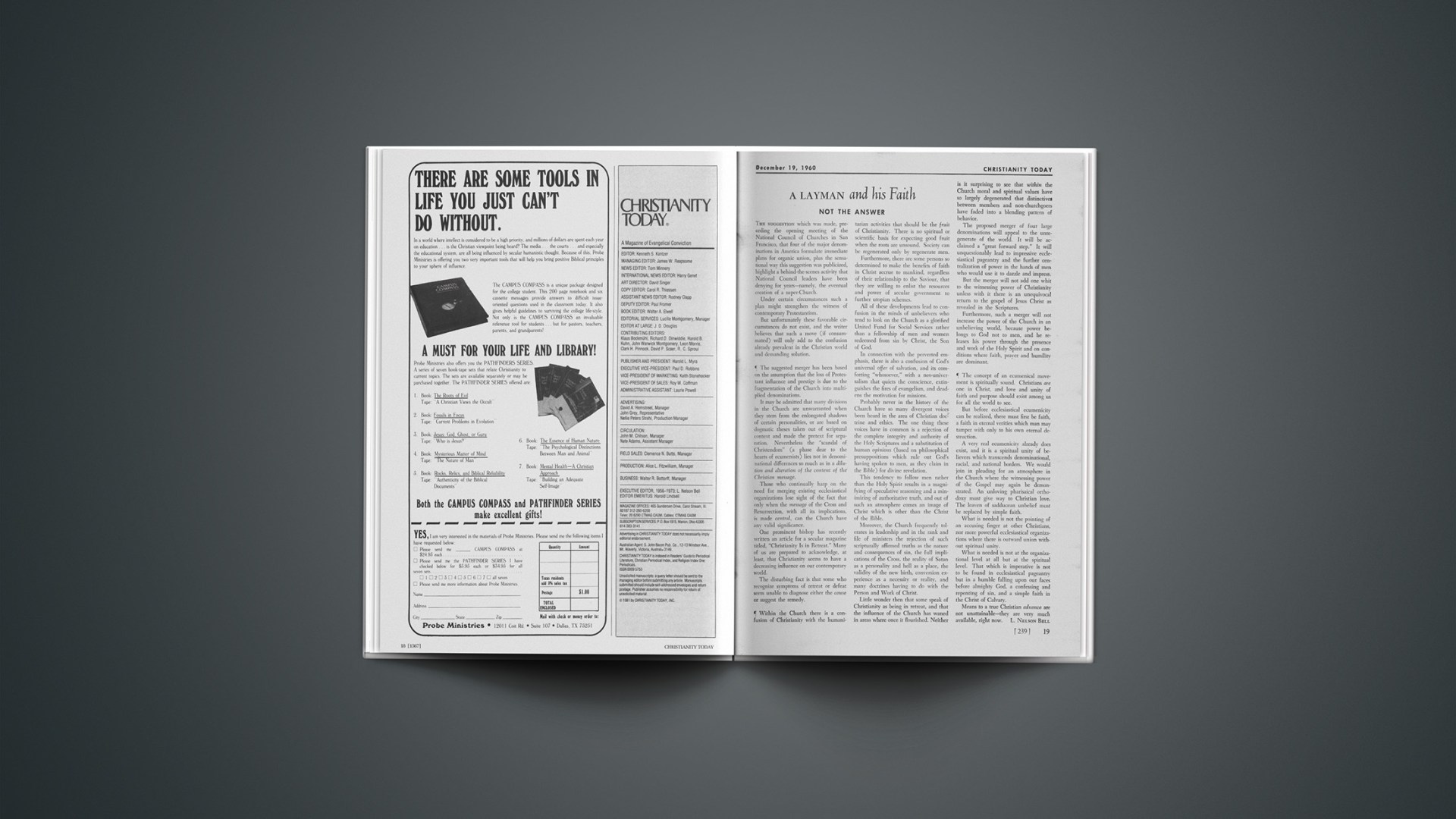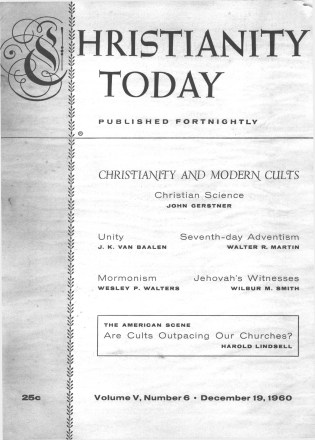NOT THE ANSWER
The suggestion which was made, preceding the opening meeting of the National Council of Churches in San Francisco, that four of the major denominations in America formulate immediate plans for organic union, plus the sensational way this suggestion was publicized, highlight a behind-the-scenes activity that National Council leaders have been denying for years—namely, the eventual creation of a super-Church.
Under certain circumstances such a plan might strengthen the witness of contemporary Protestantism.
But unfortunately these favorable circumstances do not exist, and the writer believes that such a move (if consummated) will only add to the confusion already prevalent in the Christian world and demanding solution.
The suggested merger has been based on the assumption that the loss of Protestant influence and prestige is due to the fragmentation of the Church into multiplied denominations.
It may be admitted that many divisions in the Church are unwarranted when they stem from the enlongated shadows of certain personalities, or are based on dogmatic theses taken out of scriptural context and made the pretext for separation. Nevertheless the “scandal of Christendom” (a phase dear to the hearts of ecumenists) lies not in denominational differences so much as in a dilution and alteration of the content of the Christian message.
Those who continually harp on the need for merging existing ecclesiastical organizations lose sight of the fact that only when the message of the Cross and Resurrection, with all its implications, is made central, can the Church have any valid significance.
One prominent bishop has recently written an article for a secular magazine titled, “Christianity Is in Retreat.” Many of us are prepared to acknowledge, at least, that Christianity seems to have a decreasing influence on our contemporary world.
The disturbing fact is that some who recognize symptoms of retreat or defeat seem unable to diagnose either the cause or suggest the remedy.
Within the Church there is a confusion of Christianity with the humanitarian activities that should be the fruit of Christianity. There is no spiritual or scientific basis for expecting good fruit when the roots are unsound. Society can be regenerated only by regenerate men.
Furthermore, there are some persons so determined to make the benefits of faith in Christ accrue to mankind, regardless of their relationship to the Saviour, that they are willing to enlist the resources and power of secular government to further utopian schemes.
All of these developments lead to confusion in the minds of unbelievers who tend to look on the Church as a glorified United Fund for Social Services rather than a fellowship of men and women redeemed from sin by Christ, the Son of God.
In connection with the perverted emphasis, there is also a confusion of God’s universal offer of salvation, and its comforting “whosoever,” with a neo-universalism that quiets the conscience, extinguishes the fires of evangelism, and deadens the motivation for missions.
Probably never in the history of the Church have so many divergent voices been heard in the area of Christian doctrine and ethics. The one thing these voices have in common is a rejection of the complete integrity and authority of the Holy Scriptures and a substitution of human opinions (based on philosophical presuppositions which rule out God’s having spoken to men, as they claim in the Bible) for divine revelation.
This tendency to follow men rather than the Holy Spirit results in a magnifying of speculative reasoning and a minimizing of authoritative truth, and out of such an atmosphere comes an image of Christ which is other than the Christ of the Bible.
Moreover, the Church frequently tolerates in leadership and in the rank and file of ministers the rejection of such scripturally affirmed truths as the nature and consequences of sin, the full implications of the Cross, the reality of Satan as a personality and hell as a place, the validity of the new birth, conversion experience as a necessity or reality, and many doctrines having to do with the Person and Work of Christ.
Little wonder then that some speak of Christianity as being in retreat, and that the influence of the Church has waned in areas where once it flourished. Neither is it surprising to see that within the Church moral and spiritual values have so largely degenerated that distinctives between members and non-churchgoers have faded into a blending pattern of behavior.
The proposed merger of four large denominations will appeal to the unregenerate of the world. It will be acclaimed a “great forward step.” It will unquestionably lead to impressive ecclesiastical pageantry and the further centralization of power in the hands of men who would use it to dazzle and impress.
But the merger will not add one whit to the witnessing power of Christianity unless with it there is an unequivocal return to the gospel of Jesus Christ as revealed in the Scriptures.
Furthermore, such a merger will not increase the power of the Church in an unbelieving world, because power belongs to God not to men, and he releases his power through the presence and work of the Holy Spirit and on conditions where faith, prayer and humility are dominant.
The concept of an ecumenical movement is spiritually sound. Christians are one in Christ, and love and unity of faith and purpose should exist among us for all the world to see.
But before ecclesiastical ecumenicity can be realized, there must first be faith, a faith in eternal verities which man may tamper with only to his own eternal destruction.
A very real ecumenicity already does exist, and it is a spiritual unity of believers which transcends denominational, racial, and national borders. We would join in pleading for an atmosphere in the Church where the witnessing power of the Gospel may again be demonstrated. An unloving pharisaical orthodoxy must give way to Christian love. The leaven of sadducean unbelief must be replaced by simple faith.
What is needed is not the pointing of an accusing finger at other Christians, nor more powerful ecclesiastical organizations where there is outward union without spiritual unity.
What is needed is not at the organizational level at all but at the spiritual level. That which is imperative is not to be found in ecclesiastical pageantry but in a humble falling upon our faces before almighty God, a confessing and repenting of sin, and a simple faith in the Christ of Calvary.
Means to a true Christian advance are not unattainable—they are very much available, right now.
L. NELSON BELL










